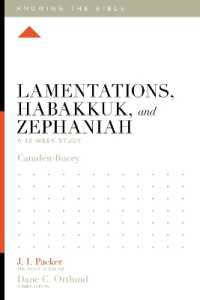- ホーム
- > 洋書
- > ドイツ書
- > Social Sciences, Jurisprudence & Economy
- > Education Science / Pedagogic
- > didactics, methodics, school education
Full Description
This book explores the intersections of neoliberalism, translation, and interpreting, a scarcely explored topic in the field of translation studies across diverse regions, including Europe, North America, Asia, and Australia, covering four primary themes that offer unique perspectives on how neoliberal ideologies influence translation and interpreting. The first theme uses data triangulation to delve into the influence of market-driven ideologies on translation and interpreting curriculum globally as well as the neoliberal tendencies of the trainees in China and Korea. The second theme investigates the effects of top-down neoliberal policies on translation services and practices in Australia, Canada, and the UAE, examining how these policies influence service quality, working conditions, and the balance between market demands and academic requirements. The third theme assesses the influence of technology and neoliberalism on the translation and interpreting labor market, providing a critical analysis of the automation of translation workflows, the rise of non-standard employment arrangements, and the socio-economic challenges faced by translation professionals. The final theme analyzes the intersection of neoliberalism and translation at the discourse level, employing various approaches including critical discourse analysis and content analysis to explore how neoliberal values manifest in translated texts and practices in China, Iran, and USA. This book is an essential resource for academics, postgraduate students, researchers, policymakers, educators, and practitioners interested in the dynamic interplay between neoliberalism and translation, offering new insights and critical perspectives that contribute to a deeper understanding of the socio-economic forces shaping the field of translation and interpreting.
Contents
Chapter 1. Introduction.- Part I: Neoliberalism Tendencies in Translation and Interpreting Education: Perspectives on Universities and Students.- Chapter 2. Translator Training in the Context of Neoliberalism: Balancing Academic Expectations and Market Forces.- Chapter 3. Translation Entrepreneurship among Translation and Interpreting Students: A Qualitative Inquiry in the Chinese Setting.- Chapter 4. In pursuit of Interpreting in Neoliberal Korea.- Part II: Neoliberal Policies and Translation Services.- Chapter 5. Community Translation and Interpretating under Neoliberal Agendas: The Cases of Australia and Canada.- Chapter 6. Impact of Neoliberalism on Public-sector Translation in Canada.- Chapter 7. Unpacking Language of Neoliberalism and Globalisation on the Linguistic Landscape of Superdiverse Dubai's posh JBR and Dubai Marina areas: Official Policy, Translation, the Juggernaut of English and 'fake' Arabic.- Part III: Neoliberalism, Technology and Labour Market Transformation in Translation and Interpreting Profession.- Chapter 8. Welcome to the (Translation) Machine! Translation Labour in Times of TechnoTriumphalism.- Chapter 9. Neoliberal Practices Endangering the Sustainability of the Translation Profession: Non-Standard Forms of Work, Labor Monopsonies, and Technology as a Catalyst for Precarization.- Chapter 10. Interpreting one's way through the gig economy: Neoliberal Shifts and the Platformization of Interpretation Work.- Chapter 11. Navigating Neoliberal Risks in Online Collaborative Literary Translation: A Case Study on Translators' Self-Efficacy and Risk Management in the Chinese Context.- Part V: Neoliberal Discourses in Translation.- Chapter 12. Children as Global Subjects: A Comparison of Translated Picture Books in the US and China.- Chapter 13. The Discourse of Neoliberalism in Translated and Domestically Produced Children's Literature in Iran.- Chapter 14. (De) emphasization of Neoliberalism Discourse in Translated and Domestic News on Education in China.








